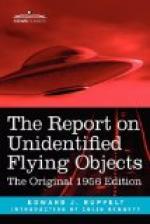As soon as he had landed and parked, the F-86 pilot went into operations to tell his story to his squadron commander. The mere fact that he had fired his guns was enough to require a detailed report, as a matter of routine. But the circumstances under which the guns actually were fired created a major disturbance at the fighter base that day.
After the squadron commander had heard his pilot’s story, he called the group commander, the colonel, and the intelligence officer. They heard the pilot’s story.
For some obscure reason there was a “personality clash,” the intelligence officer’s term, between the pilot and the squadron commander. This was obvious, according to the report I was reading, because the squadron commander immediately began to tear the story apart and accuse the pilot of “cracking up,” or of just “shooting his guns for the hell of it and using the wild story as a cover-up.”
Other pilots in the squadron, friends of the accused pilot— including the intelligence officer and a flight surgeon—were called in to “testify.” All of these men were aware of the fact that in certain instances a pilot can “flip” for no good reason, but none of them said that he had noticed any symptoms of mental crack-up in the unhappy pilot.
None, except the squadron commander. He kept pounding home his idea— that the pilot was “psycho”—and used a few examples of what the report called “minor incidents” to justify his stand.
Finally the pilot who had been flying with the “accused” man was called in. He said that he had been monitoring the tactical radio channel but that he hadn’t heard any calls from his buddy’s low-flying F-86. The squadron commander triumphantly jumped on this point, but the accused pilot tended to refute it by admitting he was so jumpy that he might not have been on the right channel. But when he was asked if he had checked or changed channels after he had lost the object and before he had finally contacted the other F-86, he couldn’t remember.
So ended the pilot’s story and his interrogation.
The intelligence officer wrote up his report of a ufo sighting, but at the last minute, just before sending it, he was told to hold it back. He was a little unhappy about this turn of events, so he went in to see why the group commander had decided to delay sending the report to Project Blue Book.
They talked over the possible reactions to the report. If it went out it would cause a lot of excitement, maybe unnecessarily. Yet, if the pilot actually had seen what he claimed, it was vitally important to get the report in to ATIC immediately. The group commander said that he would made his decision after a talk with his executive officer. They decided not to send the report and ordered it destroyed.
When I finished reading, the intelligence officer’s first comment was, “What do you think?”
Since the evaluation of the report seemed to hinge upon conflicts between personalities I didn’t know, I could venture no opinion, except that the incident made up the most fascinating ufo report I’d ever seen. So I batted the intelligence officer’s question back to him.




